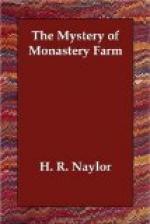Finally Billy remarked: “I will find the preacher and ask his advice,” and without further words he started to Washington Square, where his newly-found friend lived.
He was ushered into the library. He had never seen so many books before in one place. While he was glancing around in his surprise, the preacher entered. “Good evening, Mr. Sparrow,” he said. “How are you? Have you found any employment yet?”
Billy handed him the letter which had brought him there, saying: “I received this letter today, and, if you please, I should like to have your advice about it.”
The preacher opened the letter, and as he did so gave a little start. Then he smiled as he glanced down at the signature. He finished reading with a decidedly happy expression on his face, and Billy asked: “Can you tell me about this place, and of the man?”
“O, yes,” was the ready reply, “I know both the place and the man; the fact is, that is my county, and Quintin is my friend. I never had a better friend than Jerry Quintin. I always spend my vacation there. I lived there from the time I was ten years old until I was twenty-three, and always go there in summertime for a few weeks’ rest—occupying my old room, eating with the boys, and roaming in the woods; I know every tree and bypath; yes, and many a swim have I had in the old river. Jerry Quintin,” he continued, “as we used to call him. Why, I’ve known him since I was a child. Do you want to hear about him? Well, when he was a youth, not quite out of his teens, Mr. Thorndyke gave the land on which the Monastery stands, Quintin was made chairman of the board of trustees, and treasurer also. He has handled every dollar of the funds, superintended the erection of all the buildings, the laying off of the Monastery Park, and had charge of the farm; and through all the years no auditing committee had ever found an inaccuracy in his accounts. Foresight, sagacity, rectitude are synonymous terms with the name of Quintin. True as gold is Jerry Quintin. He always means what he says, and says just what he means. Let me assure you, there is no truer man in the Empire State than this same Quintin.”
A few days later Sparrow found himself set ashore at Centerville Landing at an early hour in the morning. The first thing he saw was a plainly dressed man sitting in a buckboard who, as Sparrow approached, accosted him with the words: “Mr. Sparrow, good morning. Glad to see you. Expected to see an older man. Get in, we will go round and get some breakfast and afterward go out to the farm.”
After breakfast they drove along the river road, behind an excellent team of bay horses, for a distance of about two miles, and drew up in front of a large brick house.
“This is our farm, Mr. Sparrow. We will drive on to the farm and come back to the house later.”
Everything indicated thrift and prosperity. There was a great barn and stables, a capacious warehouse, out-buildings of all sorts, corn houses, hayricks, and a building for wheat, while nearby was a shed full of modern agricultural machinery. They walked through the stables; five fine horses occupied the stalls, while close at hand were not fewer than a dozen Jersey cows.




